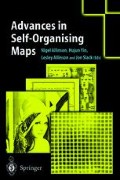Abstract
A new information-theoretic learning scheme is introduced for kernel-based topographic map formation. The kernel parameters are adjusted so as to maximize the differential entropies of the kernel outputs and, at the same time, to minimize the mutual information between these outputs. The learning scheme is based on infomax learning supplemented with a cooperative/competitive stage to achieve topographically-organized maps. As a potential application, we consider density estimation.
Access this chapter
Tax calculation will be finalised at checkout
Purchases are for personal use only
Preview
Unable to display preview. Download preview PDF.
References
Kohonen, T. (1982) Self-organized formation of topologically correct feature maps. Biol. Cybern., 43, 59–69
Kohonen, T. (1995) Self-organizing maps. Springer, Berlin Heidelberg
Durbin, R., Willshaw, D. (1987) An analogue approach to the travelling salesman problem using an elastic net method. Nature, 326, 689–691
Graepel, T., Burger, M., Obermayer, K. (1997) Phase transitions in stochastic self-organizing maps. Physical Rev. E, 56(4), 3876–3890
Sum, J., Leung, C.-S., Chan, L.-W., Xu, L. (1997) Yet another algorithm which can generate topography map. IEEE TNNS, 8(5), 1204–1207
Bishop, C.M., Svensæn, M., Williams, C.K.I. (1998) GTM: The generative topographic mapping. Neural Computat., 10, 215–234
Van Hulle, M.M. (1998) Kernel-based equiprobabilistic topographic map formation. Neural Computat., 10(7), 1847–1871
Van Hulle, M.M. (2000) Faithful representations and topographic maps: From distortion- to information-based self-organization, Wiley, New York
András, P. (2001) Kernel-Kohonen networks. Int. J. Neural Systems, submitted
Linsker, R. (1989) How to generate ordered maps by maximizing the mutual information between input and Output signals. Neural Computat., 1, 402–411
Bell A.J., Sejnowski, T.J. (1995) An information-maximization approach to blind Separation and blind deconvolution. Neural Computat., 7, 1129–1159
Weisstein, E.W. (1999) CRC Concise Encyclopedia of Mathematics. Chapman and Hall, London
Silverman, B.W. (1992) Density estimation for statistics and data analysis. Chapman and Hall, London
Author information
Authors and Affiliations
Rights and permissions
Copyright information
© 2001 Springer-Verlag London Limited
About this paper
Cite this paper
Van Hulle, M.M. (2001). Towards an information-theoretic approach to kernel-based topographic map formation. In: Advances in Self-Organising Maps. Springer, London. https://doi.org/10.1007/978-1-4471-0715-6_1
Download citation
DOI: https://doi.org/10.1007/978-1-4471-0715-6_1
Publisher Name: Springer, London
Print ISBN: 978-1-85233-511-3
Online ISBN: 978-1-4471-0715-6
eBook Packages: Springer Book Archive

